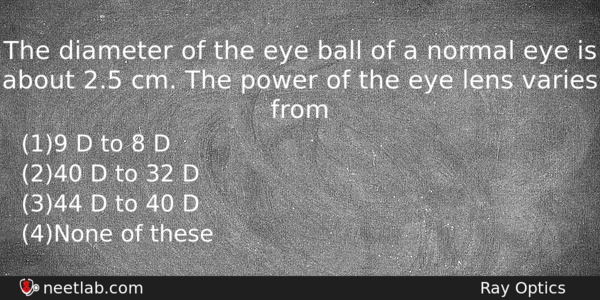| ⇦ | 
| ⇨ |
The diameter of the eye ball of a normal eye is about 2.5 cm. The power of the eye lens varies from
Options
(a) 9 D to 8 D
(b) 40 D to 32 D
(c) 44 D to 40 D
(d) None of these
Correct Answer:
44 D to 40 D
Explanation:
An eye see distant objects with full relaxation.
So, [1 / (2.5 × 10⁻²)] – [1 / -∞] = 1 / f or, P = 1 / f = 1 / 2.5 × 10⁻² = 40 D
An eye see an object at 25 cm with strain [1 / (2.5 × 10⁻²)] – [1 / 2.5 × 10⁻²] = 1 / f
.·. P = 1 / f = 40 + 4 = 44 D
Related Questions: - One-fourth length of a spring of force constant K is cut away. The force constant
- An alternating voltage given as, V=100√2 sin100t V is applied to a capacitor
- ₆C¹⁴ absorbs an energitic neutron and emits beta particles. The resulting nucleus is
- In stretching a spring by 2 cm, energy stored is given by U. Had is been stretched
- A 36 Ω galvanometer is shunted by resistance of 4 Ω. The percentage of the total current
Topics: Ray Optics
(94)
Subject: Physics
(2479)
Important MCQs Based on Medical Entrance Examinations To Improve Your NEET Score
- One-fourth length of a spring of force constant K is cut away. The force constant
- An alternating voltage given as, V=100√2 sin100t V is applied to a capacitor
- ₆C¹⁴ absorbs an energitic neutron and emits beta particles. The resulting nucleus is
- In stretching a spring by 2 cm, energy stored is given by U. Had is been stretched
- A 36 Ω galvanometer is shunted by resistance of 4 Ω. The percentage of the total current
Topics: Ray Optics (94)
Subject: Physics (2479)
Important MCQs Based on Medical Entrance Examinations To Improve Your NEET Score
18000+ students are using NEETLab to improve their score. What about you?
Solve Previous Year MCQs, Mock Tests, Topicwise Practice Tests, Identify Weak Topics, Formula Flash cards and much more is available in NEETLab Android App to improve your NEET score.
Share this page with your friends

Leave a Reply